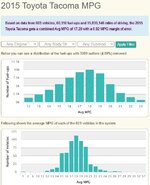I have an EV for daily driving and love it. Haven't had any issues taking it on roadtrips along the west coast. That being said, range anxiety is a reality for EVs as of now. As charging infrastructure increases, it will be less of a concern. Within a few years the total cost of ownership of EVs will be lower than ICE vehicles, so I'd imagine most everyone will transition at some point just due to cost.
For trips up in the mountains I still use an ICE vehicle and don't foresee using an EV until range is greatly increased OR charging infrastructure is readily available closer to trailheads/wilderness areas.
I looked into them but they are not practical at all in North East Oregon. Going anywhere out of the area just doesn't make sense, we recently made a bonsai trip to Montana for my wife and son to run in a Spartan, we drove about 500 miles one way on a Saturday, drove to the woods for the run, and then drove 500 miles back on Sunday morning. Driving from Eastern Oregon, through Northern Idaho into central Montana there is nowhere to charge, we could barely find a place to fuel up or eat along the way.
During hunting season we go to the woods, not a trailhead, last year I had to pack 10 extra gallons of fuel in my Tacoma just to make it back out to a gas station, that gas station was in McDerrmit Nevada, LOL another 3hrs to a town of more than a couple thousand people. We typically go to the woods and don't come out for days or even a week. I also hunt a lot in Idaho, I don't even have cell service for a week at a time there, and depending on where we are it's a couple of hour drive to the closest gas station.
Pattimusprime the below isn't necessarily directed at you but at everyone who thinks EVs are the answer;
It would be cool if EVs were practical but they are not, there is almost zero infrastructure that would support EV usage. It will cost hundreds of trillions of dollars just to get infrastructure anywhere near where it would be somewhat functional, that's not even talking rural towns, schools, hospitals, fire stations, etc.
Imagine the power output Walmart would need in order to charge all the vehicles that show up on the first of each month, our local Walmart holds 900 vehicles in the parking lot, a Tesla takes approx. 50kWh to charge the battery 1 time, that is 45.000kWh of electricity each time the lot is full. An hour to charge/shop so lets say the parking lot is full 5 times a day, holidays would be much more. So 225,000kWh of power just to charge customers' cars, OTECC charges 9.83 cents/kWh so that is about $22,050 worth of electricity that Walmart would use to charge cars each day. A Wind Turbine makes about 1.5-2MWh or 1500-2000kWh so in order to keep Walmarts customers happy and full of fuel/power they would need approx. 112 WTGs running somewhere behind Walmart to produce the amount of power they would need to charge a single day’s worth of cars. A single turbine costs roughly $2M, so roughly a $250,000.000 wind farm would need to be built (not including powerlines, substation, collection system, charging stations, tearing up and putting all the underground infrastructure to charge the cars, and repaving the lot, the list goes on and on) This is all cost just to supply 1 small town enough power to charge 900 Vehicles 1 time each day in 1 parking lot, not to mention the other 20K plus people that live there.
Please explain to me again how everyone in the US will be driving electric cars in the next few years? Who will be paying for all this infrastructure? How long will it take to build, how many wetlands, winter ranges, rivers, streams, fauna, and flora will be destroyed for the greater good so we can all travel up to a couple of hundred miles a day? How is this more environmentally friendly than the current infrastructure and fossil fuels? How about what will happen with the millions of cars on the road that need to be scrapped, all the trucks that deliver people's food, trains, farm equipment harvesting, tilling, delivering food, and ambulances that are transporting people. What will this new infrastructure look like? How will living around that much power constantly be for our health, where will all the lithium come from for all of these batteries?
It’s a pipe dream and anyone who believes it is practical or possible in the near future is smoking dope.
FYI, those above numbers are for a small Tesla, a Hummer EV has a 210kWh battery, so to charge that 1 time it would cost $20 in NE-OR, in CA paying CA Edison it would cost $59 or more depending on your Tier, still pretty cheap compared to current fuel prices, but the issue come with the masses. There just isn’t and will not be infrastructure to charge them even in a giant city with tons of people, imagine sitting at the gas station for hours or even days until you are allowed to fill up to continue on your way. What do you think will happen to electric prices once there is such a demand for it?
The people pushing this agenda are sheep and have no clue where their food and electricity come from, what happens when Dominos runs out of Pizza, everyone will be up shit creek with no clue how to paddle.
Rant Over! Sorry if I offended anyone.

